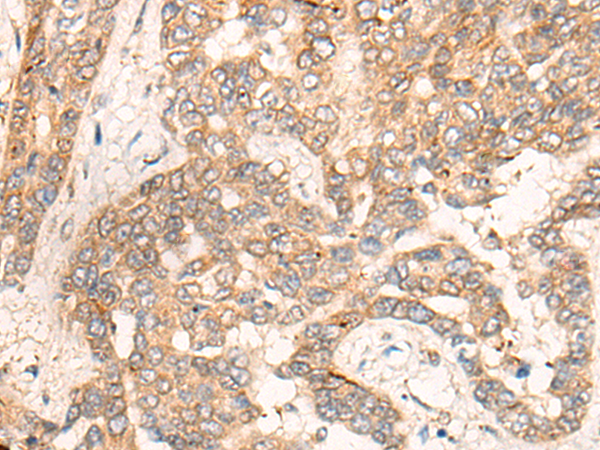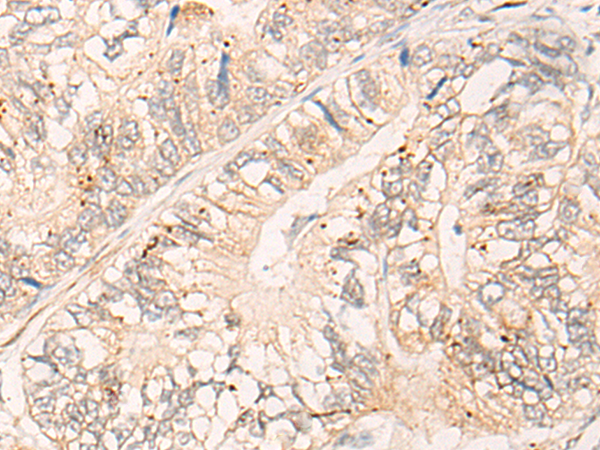

| WB | 咨询技术 | Human,Mouse,Rat |
| IF | 咨询技术 | Human,Mouse,Rat |
| IHC | 1/25-1/100 | Human,Mouse,Rat |
| ICC | 技术咨询 | Human,Mouse,Rat |
| FCM | 咨询技术 | Human,Mouse,Rat |
| Elisa | 1/5000-1/10000 | Human,Mouse,Rat |
| Aliases | CPE-BP4; hCPEB-4 |
| Host/Isotype | Rabbit IgG |
| Antibody Type | Primary antibody |
| Storage | Store at 4°C short term. Aliquot and store at -20°C long term. Avoid freeze/thaw cycles. |
| Species Reactivity | Human, Mouse |
| Immunogen | Fusion protein of human CPEB4 |
| Formulation | Purified antibody in PBS with 0.05% sodium azide and 50% glycerol. |
+ +
以下是3篇关于CPEB4抗体的代表性文献,包含标题、作者及摘要概述:
---
1. **标题**:*CPEB4 Is Regulated during Cell Cycle by ERK1/2 and Modulates Contact Inhibition*
**作者**:Fernández-Miranda et al.
**摘要**:研究利用特异性CPEB4抗体发现,ERK1/2通过磷酸化调控CPEB4的亚细胞定位,影响细胞周期进程和接触抑制,揭示其在癌症增殖中的作用。
2. **标题**:*CPEB4 Knockout Mice Exhibit Hippocampus-Dependent Memory Impairment*
**作者**:Burns et al.
**摘要**:通过CPEB4抗体检测基因敲除小鼠脑组织,发现CPEB4缺失导致海马突触蛋白翻译异常,提示其在神经记忆功能中的关键调控作用。
3. **标题**:*A Novel CPEB4-Specific Antibody for Immunohistochemical Analysis in Solid Tumors*
**作者**:Li et al.
**摘要**:团队开发并验证了一种高特异性CPEB4抗体,用于肿瘤组织染色,结果显示其在胰腺癌和胶质瘤中高表达,与患者预后负相关。
---
这些文献分别从分子机制、神经科学及癌症研究角度展示了CPEB4抗体的应用。如需更详细内容或具体发表信息,可进一步在PubMed或Google Scholar中检索对应标题。
The CPEB4 antibody is a research tool designed to detect and study the Cytoplasmic Polyadenylation Element-Binding Protein 4 (CPEB4), a member of the CPEB family of RNA-binding proteins. CPEB proteins regulate mRNA translation by binding to cytoplasmic polyadenylation elements (CPEs) in the 3' untranslated regions (UTRs) of target mRNAs, modulating their poly-A tail length and thus their stability and translational efficiency. CPEB4. in particular, has gained attention for its role in cellular stress responses, cancer biology, and neurodegenerative diseases. It is overexpressed in certain cancers, where it promotes tumor angiogenesis, metastasis, and chemoresistance by regulating pro-tumorigenic mRNAs. In neurodegenerative contexts, CPEB4 dysfunction has been linked to protein aggregation and synaptic defects.
CPEB4 antibodies are typically produced in hosts like rabbits or mice using immunogenic peptides derived from conserved regions of the human CPEB4 protein. These antibodies enable researchers to investigate CPEB4 expression, localization, and interactions via techniques such as Western blotting, immunohistochemistry (IHC), immunofluorescence (IF), and co-immunoprecipitation (Co-IP). Validated antibodies are critical for distinguishing CPEB4 from other CPEB family members (e.g., CPEB1-3) due to structural similarities. Commercial CPEB4 antibodies often include validation data (e.g., knockout cell line controls) to ensure specificity. Their applications span basic research in gene regulation, cancer mechanisms, and neurological disorders, as well as potential diagnostic or therapeutic development.
×